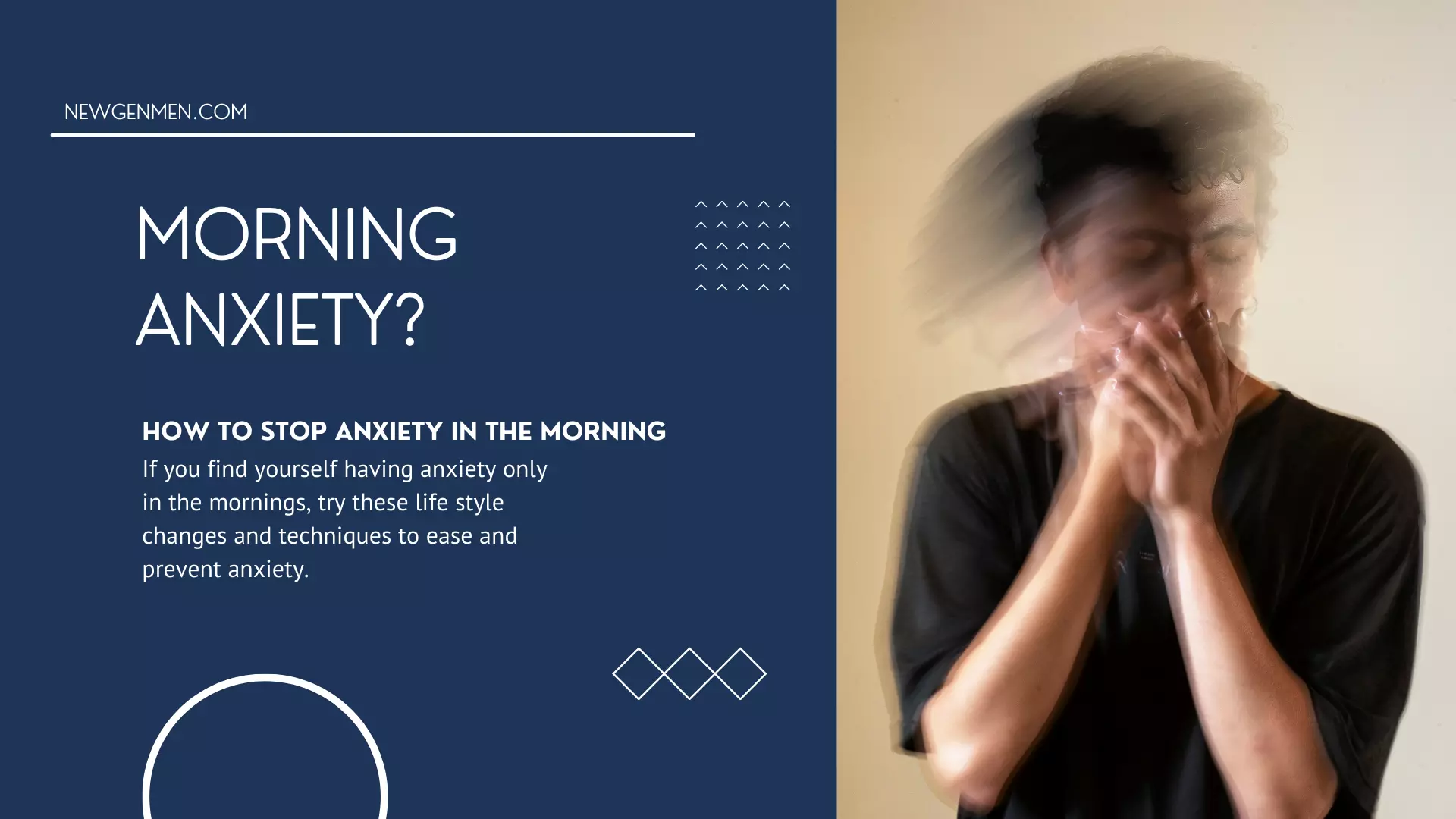How to stop anxiety in the morning. If you find yourself having anxiety only in the mornings, try these life style changes and techniques to ease and prevent anxiety.
If you’ve ever woken up with your heart racing– and not due to having a bad dream, you may be suffering from anxiety in the morning. It’s really not a great way to start the day where your first thoughts are that your world is falling apart. There seems to be no rhyme or reason to it either. You got a great night of sleep and there’s nothing in your life that’s going wrong for you to wake up feeling terrified and upset.
It may only be a few nights a month, but is recurring enough to cause you concern. Well, the good part is you’ve identified that your anxiety levels may be higher in the morning, and that’s the first step in finding out why it’s happening and how to get rid of it.
Why Do You Wake Up With Anxiety?
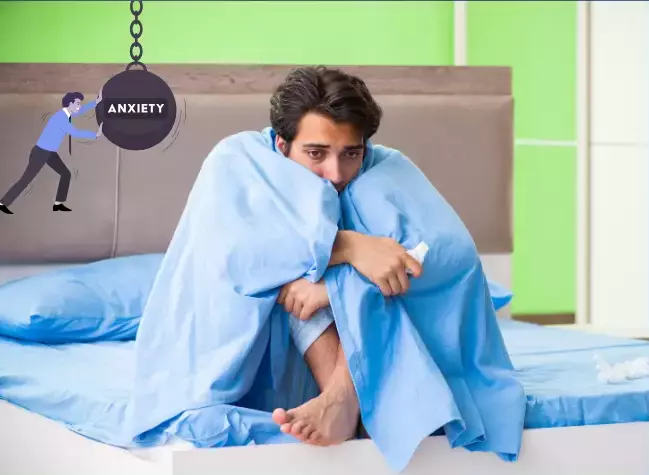
It can be hard to pinpoint the exact reason why you’re waking up with anxiety in the mornings, it could be a combination of many factors, mainly caused by lifestyle choices. It’s important to remember that anxiety is a complex emotion influenced by both physiological and psychological elements.
Some of the biggest culprits of causing anxiety in the morning are:
Stress and Worries:
Anxiety often results from stress, and many people experience heightened stress and worries in the morning. This could be due to concerns about the day ahead, work, personal issues, or other stressors. Major life changes, such as starting a new job, moving, or experiencing significant life transitions, can generate morning anxiety as you face the uncertainty.
Cortisol Levels:
Cortisol, a stress hormone, tends to be highest in the morning. Elevated cortisol levels can contribute to feelings of anxiety or nervousness. This is part of the body’s natural circadian rhythm, but when it’s out of balance, it can lead to anxiety upon waking.
Nightmares or Disturbing Dreams:
Vivid or distressing dreams, including nightmares, can evoke anxiety upon waking. These dreams may be related to unresolved issues, stressors, or anxiety triggers.
Lack of Sleep:
Poor sleep quality or insufficient sleep can exacerbate anxiety. When you don’t get enough restorative sleep, your body and mind may be more vulnerable to anxiety. Sleep is essential for managing stress and anxiety.
Diet and Caffeine:
Consuming stimulants like caffeine, especially in excess or close to bedtime, can disrupt sleep and contribute to anxiety upon waking. An imbalanced diet or low blood sugar levels in the morning can also trigger anxiety.
Anxiety Disorders:
As expected, people with anxiety disorders, such as generalized anxiety disorder or panic disorder, may experience high anxiety upon waking as a symptom of their condition. These disorders can cause persistent, excessive worry and anxiety.
Hormonal Changes and Medical Conditions:
Certain medical conditions, such as thyroid disorders or heart problems, can cause anxiety as a symptom. It’s important to rule out any underlying medical causes if you consistently wake up anxious. Hormonal fluctuations, such as those experienced during menopause, can lead to increased anxiety in the morning for some individuals.
How To Stop Anxiety In The Morning
You may be someone that has general anxiety throughout the day but experience it at its highest in the morning. Or maybe you don’t typically have anxiety but only feel it really bad some mornings.
If you find yourself having anxiety only in the mornings, try these life style changes and techniques to ease and prevent anxiety.
Prioritize Sleep
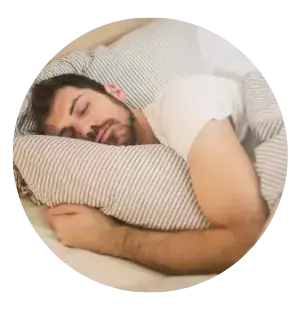
Ensure you get enough sleep by establishing a regular sleep schedule and creating a comfortable sleep environment. Avoid stimulating activities, foods, and beverages before bedtime.
Establish a Consistent Morning Routine

Create a structured morning routine to provide a sense of stability and predictability. Wake up early and don’t linger in bed whether you have work or it’s a day off. Take your shower (cold shower if you can stand it), eat a light, healthy breakfast, and start your work/activities for the day.
Mindfulness and Meditation
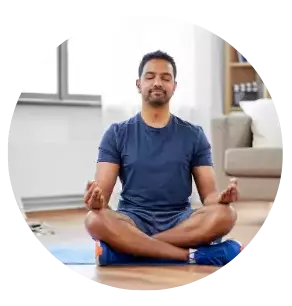
Engage in mindfulness meditation to ground yourself in the present moment and reduce anxious thoughts. Take 5-10 minutes to just sit in silence with no phone to just reflect on what’s going on in your mind. Guided meditation apps or free videos on YouTube can be helpful for beginners.
Deep Breathing Exercises

Practice deep breathing exercises to relax your nervous system. The 4-7-8 technique, where you inhale for 4 seconds, hold for 7 seconds, and exhale for 8 seconds, is a simple and effective method. You can find many videos on YouTube that will help guide you through different techniques.
Accupressure Points
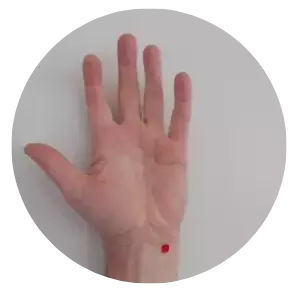
Acupressure is used in traditional Chinese medicine and treatments and is the practice of treating blocked qi (energy) by applying pressure to key pressure points in the body. The Shen Men point is used to alleviate symptoms of anxiety disorder, panic, insomnia, stress, and even over-active sweating. Apply pressure and/or rub in circles for a 1-3 minutes to help alleviate anxiety.
Avoid Large Meals Close to Bedtime

Finish your last substantial meal at least 2-4 hours before bedtime. A heavy meal too close to bedtime can lead to discomfort, indigestion, and can disrupt your sleep, leading to waking up tired and anxious.
Limit Caffeine, Alcohol, and Sugar

Avoid caffeine, alcohol, and sugary foods and drinks for at least 4-6 hours before sleep. These substances can interfere with sleep and contribute to anxiety. Also reduce or eliminate caffeine intake in the morning. Opt for caffeine-free herbal tea or water.
Balanced Breakfast

Consume a nutritious and balanced breakfast. Include foods rich in complex carbohydrates, protein, and healthy fats, which can help stabilize blood sugar levels and energy throughout the morning.
Regular Exercise

Engage in regular physical activity, which has been shown to reduce anxiety. Morning exercise can help get rid of the stress and unnecessary adrenaline in your body and will have you starting your day in a positive mood.
Journaling

Write down your thoughts and feelings in a journal. This can help you process and release anxious thoughts and emotions. You may be able to identify reoccurring negative thoughts and worries that you can begin to resolve. Writing can also be a calming and creative exercise.
Positive Affirmations
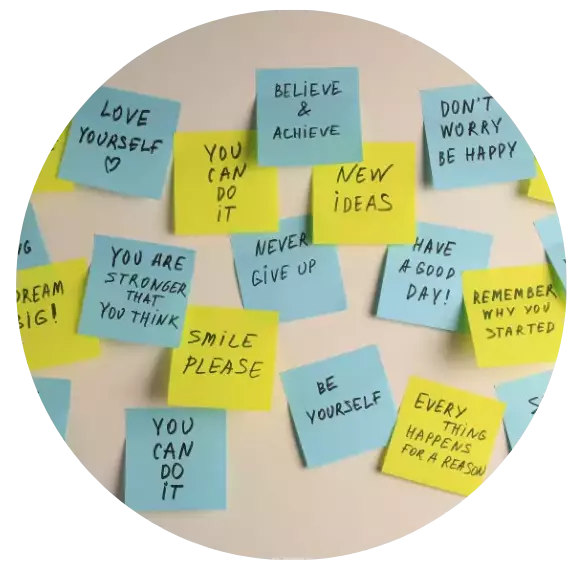
Practice positive affirmations to shift your mindset from negative to positive. Repeating affirmations can boost self-confidence and reduce anxiety. It may sound silly but having a positive mantra you can constantly repeat like, “I am strong and can accomplish anything I want”, can help push away negative thoughts and feelings.
Limit News and Social Media Exposure

Consider avoiding news and social media before bed and in the morning to prevent exposure to potentially distressing information. End and start your day with positive or neutral content.
Quick Morning Relaxation Techniques
Relaxation techniques can be highly effective in reducing morning anxiety. Here are several relaxation techniques that you can incorporate into your daily routine to help stop anxiety in the morning:
Deep Breathing Exercises:
To alleviate anxiety, practice this 4-7-8 breathing exercise. Find a comfortable seated position, close your eyes, and inhale through your nose for a count of four. Hold your breath for a count of seven, and then exhale slowly and completely through your mouth for a count of eight. Repeat this cycle three more times.
This exercise can help calm your nervous system, reduce anxiety, and promote a sense of relaxation and control.
Progressive Muscle Relaxation:
Close your eyes, and start by taking a few deep breaths. Focus your attention on one muscle group at a time, beginning with your feet. Tense the muscles in your feet for a few seconds, and then release, feeling the tension melt away.
Gradually work your way up through your body, tensing and then relaxing each muscle group, from your calves to your thighs, abdomen, chest, arms, and finally your face. Breathe deeply and slowly throughout, concentrating on the release of tension with each exhale.
Visualization:
Close your eyes visualize yourself waking up in the morning, feeling refreshed and positive. Visualize your day unfolding smoothly, step by step, from your morning routine to your tasks, meetings, and interactions.
Envision yourself handling challenges with confidence and ease, and picture positive outcomes for your plans. As you go through this mental rehearsal, focus on a sense of control and calm, knowing that you are fully prepared for whatever the day brings. This exercise can help reduce anxiety by mentally preparing you for a successful and stress-free day.
Aromatherapy:
To ease morning anxiety using aromatherapy, incorporate soothing scents into your daily routine. Consider scents like lavender, which can promote relaxation and reduce stress, or citrus scents like orange or lemon, known for their energizing and mood-lifting properties. Another option is peppermint, which can invigorate your senses and improve focus.
To utilize aromatherapy, you can use candles, air fresheners, or add a few drops of essential oil to a diffuser or a tissue placed near your workspace. Alternatively, mix a couple of drops of essential oil with a carrier oil like jojoba, almond, or coconut oil and apply it to your pulse points or the back of your neck for a subtle, all-day calming effect.
Yoga or Stretching:
For a quick and effective yoga/stretching routine to alleviate anxiety, start with a gentle forward fold, slowly bending at the waist to reach for your toes while keeping your knees slightly bent to release tension in your lower back and hamstrings. Transition into a seated spinal twist, alternating sides, to ease back tension and improve digestion.
Follow this with a child’s pose (kneel on the floor sitting on your legs and stretch your arms and head forward to floor) to relax your back and shoulders. Finally, complete the routine with the corpse pose (savasana), lying flat on your back with your arms at your sides, to integrate the relaxation and reduce anxiety. Each stretch should be held for about 30 seconds, and remember to breathe deeply and focus on the sensations to promote calmness and relieve anxiety.
Nature Exposure:
Spending time in nature can be a powerful antidote to anxiety, offering a natural and effective way to soothe the mind and calm the nerves. The serene and tranquil environments found outdoors have a unique ability to reduce stress and anxiety. In the morning, consider taking a leisurely walk in a nearby park or forest.
The rhythmic act of walking can be meditative, allowing you to clear your mind and focus on the beauty of nature. Alternatively, you can practice yoga or meditation in an outdoor setting, immersing yourself in the sights and sounds of the natural world while connecting with your inner self. If you’re near water, try activities like kayaking or simply sitting by a lake or river to absorb the soothing qualities of flowing water.
Binaural Beats or Calming Music:
Binaural beats and calming music can be valuable tools for managing morning anxiety. Binaural beats are designed to synchronize brainwaves, which can help induce a state of relaxation and reduce anxiety.
For anxiety in the morning, consider using binaural beats or calming music with a frequency range of 4-7 Hz (theta waves) or 8-12 Hz (alpha waves), as these are associated with relaxation and increased focus. Additionally, nature sounds or ambient music with a slow tempo can create a serene atmosphere.
Warm Bath or Shower:
Taking a warm bath in the morning can be a soothing ritual to alleviate anxiety and start your day with a sense of calm and ease. The warmth of the water helps relax tense muscles and promotes a feeling of comfort and security.
To enhance the anxiety-relieving effects, consider adding bath salts or essential oils with calming scents like lavender, chamomile, or eucalyptus. These scents have been known to reduce stress and induce a sense of relaxation. As you soak, focus on the sensory experience, breathe deeply, and let go of anxious thoughts. This will definitely help start your day at a relaxed pace.
Does Anxiety Come From Genetics?
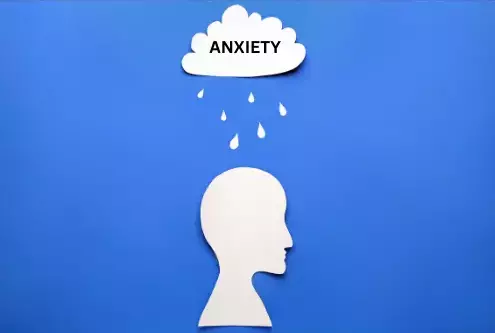
Anxiety can have a genetic component, but it is a complex and multifaceted condition influenced by a combination of genetic, environmental, and psychological factors. While genetics may play a role in predisposing someone to anxiety, it is not the sole determinant.
- Genetic Predisposition: Research suggests that some people may have a genetic predisposition to anxiety disorders. This means that if there is a family history of anxiety disorders, an individual might be at a higher risk of developing one themselves. Specific genes associated with anxiety have been studied, although the exact genetic factors are still not fully understood.
- Environmental Factors: Environmental factors, such as early life experiences, traumatic events, chronic stress, and upbringing, can also significantly contribute to the development of anxiety disorders. These environmental factors can interact with genetic predispositions.
- Brain Chemistry: The neurotransmitters and brain circuits that regulate emotions and stress responses are believed to be involved in anxiety. Genetic variations can influence the functioning of these neurotransmitter systems, which in turn may affect a person’s vulnerability to anxiety.
- Personality Traits: Certain personality traits, such as being naturally more anxious or neurotic, can be influenced by genetics. These traits can increase the likelihood of experiencing anxiety in response to stressors.
- Learned Behavior: Observational learning and social modeling, which are not directly related to genetics, can also contribute to the development of anxiety. People may learn anxious behaviors from their family or environment.
More resources to help with anxiety:
Anxiety and Depression Association of America (ADAA): The ADAA website offers a wealth of information about anxiety and related disorders, as well as resources for finding treatment and support.
The Anxiety Guy: This YouTube channel offers a variety of videos focused on anxiety management, self-help techniques, and personal experiences with anxiety.
r/Anxiety: This subreddit is a community for people dealing with anxiety. It’s a place to share experiences, ask questions, and find support.
The Anxiety and Phobia Workbook” by Edmund J. Bourne, Ph.D.: This comprehensive workbook provides practical, evidence-based strategies and exercises for managing anxiety and phobias. It covers a wide range of anxiety-related issues and is often used as a self-help guide.
Also Read:

